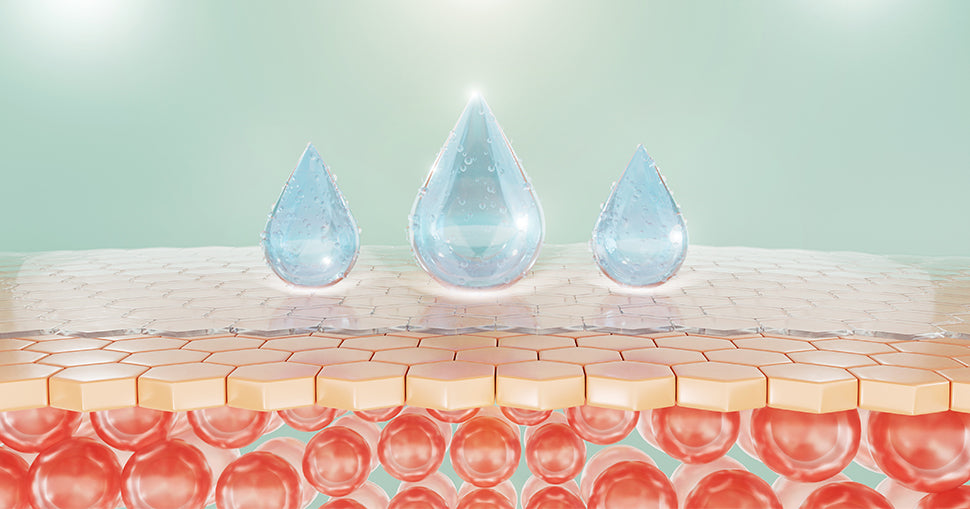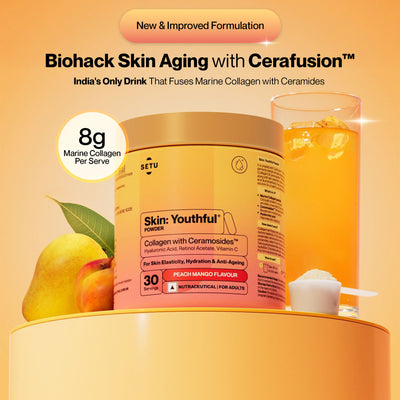The Magic Molecule: An Inside Look at How Glutathione Works
11 Mar 2024
Introduction to Glutathione
Glutathione is an antioxidant that is naturally produced in the body and plays a major role in health and disease prevention. It is a tripeptide molecule made up of three amino acids - cysteine, glycine, and glutamate.
Glutathione is found in all human cells and is the most abundant antioxidant in the body. It plays a crucial role in protecting cells from oxidative stress and damage. Oxidative stress occurs when there is an imbalance between free radicals and antioxidants in the body. Free radicals are unstable molecules that can cause damage to cells and tissues.
Glutathione neutralizes these harmful free radicals, preventing them from causing damage to important cellular components like DNA and cell membranes. It is a vital part of the body's defense system.
In addition to its antioxidant properties, glutathione has several other important functions:
- Detoxification - It helps remove toxins and heavy metals from the body. Many pollutants and chemicals get converted into less harmful compounds with the help of glutathione.
- Immune function - Glutathione improves immunity by supporting the production of lymphocytes and cytokines. It also optimizes T-cell function.
- Mitochondrial health - It helps maintain mitochondrial health by reducing oxidative stress in these important cellular organelles. Healthy mitochondria are critical for overall health and longevity.
- Anti-aging - By reducing oxidative damage and inflammation, glutathione slows down the aging process and promotes longevity.
- Skin health - Glutathione inhibits melanin production, contributing to an even skin tone and reduced appearance of dark spots and blemishes. This supports a bright, luminous complexion.
- Cognitive health - It protects brain cells from free radical damage and improves cognitive functions like memory, focus and concentration.
Glutathione Production in the Body
Glutathione is a key molecule that is absolutely essential for good health. It is considered the "master antioxidant" that boosts overall health and resistance to disease. Maintaining optimal levels of glutathione is critical for biological processes and reducing oxidative stress.
Glutathione is produced naturally in the human body from the amino acids cysteine, glycine, and glutamate. The body makes glutathione through a two-step biochemical reaction that combines these precursor amino acids.
First, cysteine and glutamate are bonded together by the enzyme glutamate cysteine ligase. This reaction forms an intermediate molecule called gamma-glutamylcysteine. Next, the enzyme glutathione synthetase adds glycine to the gamma-glutamylcysteine, forming the complete glutathione molecule.
The chemical structure of glutathione contains three amino acids linked together:
- Glutamate
- Cysteine
- Glycine
Glutathione has a peptide bond between the amine group of cysteine and the carboxyl group of the glutamate side chain. It also has a peptide bond between glycine and the glutamate portion. The thiol (-SH) group of the cysteine portion gives glutathione its antioxidant activity.
Glutathione is continually regenerated in healthy cells through this two-step process. The body is able to maintain optimal levels of glutathione unless production is impaired by disease, poor nutrition, or aging. Ensuring adequate levels of the precursor amino acids is crucial for the synthesis of new glutathione molecules in cells.
Antioxidant Properties
Glutathione is the most abundant antioxidant produced in the body. It plays a key role as an antioxidant by protecting cells from free radicals and oxidative stress.
Free radicals are molecules produced through normal cellular metabolism as well as from external sources like pollution, cigarette smoke, radiation, medications, and unhealthy foods. If too many free radicals accumulate, it leads to oxidative stress which damages important cellular components like proteins, membranes, and DNA.
Glutathione neutralizes free radicals by donating an electron to stabilize them. This prevents free radicals from causing oxidative damage to cells. Glutathione also recycles and reactivates oxidized vitamins C and E, maintaining a pool of antioxidant activity within the cell.
By scavenging free radicals and reducing oxidative stress, glutathione provides a major protective effect against cellular damage throughout the body. This helps prevent chronic diseases and protects tissues from aging. Glutathione's antioxidant capacity is a key reason why it's considered a vital molecule for overall health.
Detoxification
Glutathione is crucial for detoxification in the body. It binds to toxins such as heavy metals, solvents, pesticides, and other harmful substances, and transforms them into water-soluble compounds that can then be excreted from the body.
The liver is the main site of detoxification, and glutathione is abundant in liver cells. When toxins enter the liver, glutathione conjugates with them through a reaction catalyzed by the enzyme glutathione S-transferase. This conjugation makes the toxins more water-soluble so they can be eliminated via bile and urine.
Some toxins are fat-soluble when they enter the body, which allows them to dissolve in lipids and membranes, making them more harmful. Conjugation with glutathione converts them into forms that are easier for the body to excrete. Numerous studies have shown that glutathione deficiency impairs the body's capacity to detoxify properly.
Therefore, adequate glutathione levels are crucial for binding to toxins and clearing them from the body before they can accumulate and cause damage. The detoxification role of glutathione protects us from the harmful effects of environmental pollutants, heavy metals, and other toxins we're exposed to on a daily basis.
Immune Function
Glutathione is critical for proper immune function. It plays several important roles:
Boosts Immune Cells
Glutathione is needed for the proliferation of lymphocytes - immune cells like T cells and NK cells that destroy pathogens. It also supports macrophage function, which engulf and destroy foreign invaders.
Regulates Inflammation
The immune system must be able to turn inflammation on and off appropriately. Glutathione helps regulate inflammatory cytokines and immune cell activity. Optimal glutathione levels prevent excessive inflammation that can damage healthy tissues.
Mitochondrial Health
The energy production that powers immune cells relies on healthy mitochondria. By supporting mitochondrial function, glutathione enables robust immune responses.
In summary, glutathione is indispensable for immune defense. It enables immune cells to proliferate, battle pathogens, regulate inflammation, withstand oxidative stress, and maintain energy levels. Boosting glutathione can strengthen the immune system and help fight infections.
Anti-Aging
Glutathione plays an important role in anti-aging and preventing age-related diseases. As we get older, glutathione levels naturally decline. This age-related glutathione deficiency is associated with increased oxidative stress and chronic inflammation, which accelerates the aging process.
Declining glutathione levels are linked to many age-related diseases including cancer, neurodegenerative diseases like Alzheimer's and Parkinson's, cardiovascular disease, eye diseases like cataracts and macular degeneration, diabetes, arthritis and osteoporosis. Replenishing glutathione levels can help slow the aging process and reduce the risk of age-related diseases.
Glutathione helps regulate cell proliferation and cell death. It helps maintain the immune cells called lymphocytes, which decline with age. Glutathione also helps mitochondria function properly. Declining mitochondrial function is a hallmark of aging. By supporting mitochondrial health, glutathione helps combat the aging process.
In addition, glutathione plays a role in DNA repair and synthesis. DNA damage accumulation is a factor in aging. Glutathione helps protect DNA integrity. It also helps produce telomerase, an enzyme that maintains telomere length. Telomere shortening is associated with aging and disease.
Overall, glutathione has widespread anti-aging effects by reducing oxidative stress and inflammation, supporting immune function and mitochondria, protecting DNA, and regulating cellular health. Boosting glutathione levels may help promote longevity and healthy aging.
Skin Health
Glutathione is crucial for skin health. It protects skin cells from UV radiation and other sources of oxidative damage. UV exposure generates free radicals that can lead to skin aging, dark spots, wrinkles, and even skin cancer.
By neutralizing free radicals and reducing oxidative stress, glutathione helps protect skin cells from damage caused by environmental pollutants, UV radiation, and other external factors. This antioxidant activity helps to prevent premature aging signs such as wrinkles, fine lines, and hyperpigmentation, thereby promoting a more youthful and radiant complexion. Studies show higher glutathione levels reduce UV damage to the skin.
Additionally, glutathione supports the body's natural detoxification processes, aiding in the removal of harmful toxins and promoting clearer, healthier-looking skin.
Its ability to inhibit melanin production also contributes to a more even skin tone and reduced appearance of dark spots and blemishes, resulting in a brighter and more luminous complexion.
Glutathione also supports collagen production. Collagen provides structure in connective tissues like the skin. With age, collagen breaks down more rapidly, leading to wrinkles and sagging. The antioxidative effects of glutathione help slow this collagen breakdown. Glutathione precursors like N-acetylcysteine (NAC) have been shown to increase collagen synthesis in both human and animal studies.
By protecting against UV damage, inhibiting excess melanin, and supporting collagen, glutathione helps keep skin looking youthful and healthy. An easy way to incorporate Glutathione into your skin care routine is by incorporating a powerful, science-backed Glutathione formula into your diet, such as Setu Skin: Renew – Glutathione. This contains Vitamin C for higher absorption and added skin-boosting benefits.
Cognitive Function
Glutathione plays a critical role in brain health and cognitive function. The brain is particularly vulnerable to oxidative stress due to its high oxygen consumption and lipid-rich environment. Glutathione helps protect brain cells from free radical damage. It also helps recycle antioxidants like vitamin C and E in the brain, maintaining their neuroprotective effects.
Ways to Increase Glutathione
Glutathione levels can be increased through lifestyle changes and supplementation. Here are some of the top ways to boost glutathione levels naturally:
Diet
- Consume sulfur-rich foods like garlic, onions, broccoli, and cabbage. Sulfur is a component of glutathione.
- Eat foods rich in glutathione precursors like avocado, spinach, asparagus, squash, and grapefruit.
- Get enough protein through meats, dairy, eggs, and legumes. Glutathione is made from amino acids.
- Stay hydrated and drink water throughout the day. Dehydration can deplete glutathione.
Exercise
- Do both cardio and strength training. Exercise boosts glutathione levels and helps fight oxidative stress.
- Try high intensity interval training (HIIT). The intensity of HIIT workouts increases glutathione production.
- Aim for at least 150 minutes of moderate exercise or 75 minutes of vigorous exercise per week.
Supplements
- Take a safe Glutathione supplement, like Setu Skin: Renew – Glutathione. This comes in a fizzy tablet form – simply add it to a glass of water, stir, and drink up for daily benefits!
- Try N-acetylcysteine (NAC). NAC is used to make and replenish glutathione.
- Include alpha-lipoic acid, milk thistle, and selenium in your diet. These support glutathione production.
- Consume natural glutathione boosters, like sulforaphane from broccoli sprouts or curcumin.
Following an active lifestyle with nutrient-dense whole foods and targeted supplementation can help maintain optimal glutathione status. Work with a healthcare provider to determine the best glutathione boosting regimen for your individual needs.
Conclusion
Understanding how glutathione works sheds light on its pivotal role as the body's master antioxidant and detoxifier. Its ability to neutralize free radicals, reduce oxidative stress, and support detoxification processes is crucial for maintaining overall health and promoting radiant skin.
While it is naturally produced within the body, various factors such as aging, stress, and environmental pollutants can deplete glutathione levels, making supplementation necessary for some individuals. Common ways of consuming glutathione can be through dietary sources, like fruits and vegetables, as well as through oral supplements.
Studies suggest powerful benefits of Glutathione supplements for promoting skin health, supporting immune function, and combating oxidative stress-related conditions. However, individual responses may vary, and consulting with a healthcare professional is recommended before incorporating glutathione supplements into your routine.
Overall, whether through dietary sources or supplementation, harnessing the power of glutathione can offer numerous health benefits and contribute to overall well-being.
Skin: Renew - Glutathione - Orange Flavour
- ₹1,996
- ₹1,996
-
₹2,600 - ( 23% OFF)
Categories
- Choosing a selection results in a full page refresh.
- Press the space key then arrow keys to make a selection.
this is the sidecart
















